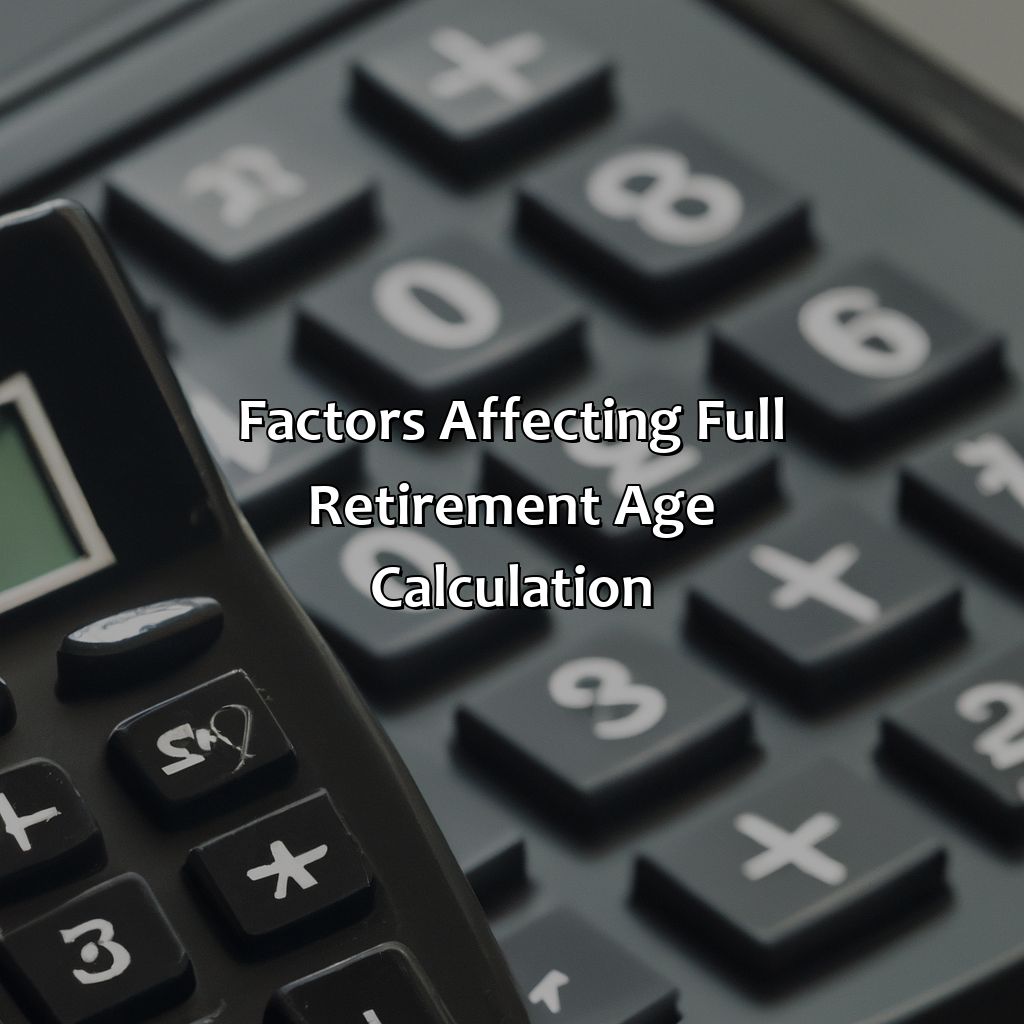What Is Ssa Full Retirement Age?
Key Takeaway:
- Full Retirement Age (FRA) refers to the age at which a person can receive their full Social Security retirement benefit, which is dependent on the year of birth. It is important to understand FRA to make informed decisions on claiming Social Security benefits.
- Factors that affect FRA calculation include birth year and retirement benefit reduction. Those born later are subject to a higher FRA, and early retirement benefits may be reduced if claimed before FRA.
- Delaying retirement beyond FRA can result in increased monthly benefit amounts and higher lifetime earnings. However, it is important to consider individual financial needs and health status in deciding when to claim Social Security benefits.
Do you want to learn about Social Security Administration’s Full Retirement Age? This article explains all the important details, so you can plan your retirement accordingly and experience financial security. You’ll be able to decide if Full Retirement Age is the right choice for you.
Definition of Full Retirement Age
The full retirement age (FRA) refers to the age when a person becomes eligible for full Social Security retirement benefits. This age is not fixed and varies according to one’s birth year. The FRA is a fundamental concept in retirement planning and financial forecasting for those seeking to maximize their social security benefits.
It is important to note that claiming one’s Social Security benefits before the FRA, typically results in a reduction of the monthly payments, while waiting to receive benefits after the FRA can lead to increased payments. As of 2021, the full retirement age ranges between 66 and 67 years, depending on one’s birth year.
One unique detail to consider is that individuals can claim reduced benefits at age 62, which is earlier than FRA. However, this may not be ideal for those seeking to maximize their social security benefits.
A friend of mine, John, was born in 1960 and was initially planning to claim his benefits at age 62. After consulting with a social security expert, he realized that waiting until full retirement age would result in a significant increase in monthly payments and provide better financial security in the long term. This decision has put John on a more comfortable financial path for his retirement years.

Image credits: retiregenz.com by David Woodhock
Factors Affecting Full Retirement Age Calculation
Need to calculate your full retirement age? Factors to be considered are important. This section explains it all. It’s got two sub-sections – Birth Year and Retirement Benefit Reduction. Find out what you need to know and plan smart for your retirement.

Image credits: retiregenz.com by Adam Arnold
Birth Year
The year of your birth plays a crucial role in calculating your full retirement age. The Social Security Administration (SSA) determines it based on the year you were born.
As per SSA, if you were born in 1960 or later, your full retirement age is 67 years. However, if you were born before 1960, then your full retirement age will be less than 67 years. For instance, if you were born between 1943 to 1954, then your full retirement age is 66 years.
It’s important to know that claiming early benefits can lower the monthly amount you receive for the rest of your life. But delaying getting benefits after reaching full retirement age could increase them by a certain percentage up to the age of 70.
Understanding how the year of birth impacts and the various calculations involved in determining SSA’s full retirement age can help you plan better for your future. You don’t want to miss out on receiving the optimal benefits as per SSA regulations.
Take note of these factors and consult an expert to ensure that you make informed decisions about when to claim social security benefits and retire accordingly.
Retirement Benefit Reduction: Because who needs a full paycheck when you can have small portions for the rest of your life?
Retirement Benefit Reduction
When you take retirement before SSA FR age, your benefits are reduced. Here’s how this impacts your overall retirement benefit:
- Reduction percentage is higher when filing early (e.g., 30% reduction at age 62) than when reduced for taking benefits between 62 and full retirement age
- If you continue to work while receiving benefits before the Full Retirement Age, then a part of your monthly income could need to be given back
- Monthly Social Security benefit payments can increase once you reach full retirement age if there were reductions due to FRA limits or deductions
- Reduced benefits may impact whether your spouse qualifies for survivor benefits after death, depending on contribution records of both individuals
- Prior earnings may determine benefit amount reduced before reaching full retirement age
It’s essential that you understand Retirement Benefit Reduction rules in order to maximize the social security payment you receive during your golden years. A little bit of planning beforehand can go a long way.
Pro Tip: It’s best to take Social Security only after calculating the cost-benefit of delaying until reaching full retirement age so that retirees can receive unreduced payments.
Delaying retirement beyond full retirement age is like aging a fine wine, but with the added bonus of still being able to drink it.
Benefits of Delaying Retirement Beyond Full Retirement Age
Maximize your retirement benefits by delaying retirement past your full retirement age. Benefits include more money each month and higher lifetime earnings. Try it out!

Image credits: retiregenz.com by Joel Arnold
Increased Monthly Benefit Amount
Maximizing Social Security Payouts by Delaying Retirement Age
Delaying retirement beyond the Full Retirement Age (FRA) can lead to increased monthly benefit amounts. The longer you delay, up to age 70, the higher is your payout amount. Essentially, for every year past FRA that you wait, the benefit increases by 8% until age 70.
Delaying retirement not only increases social security payouts but also ensures long term financial stability. By planning for a secure future, one can effectively manage other financial matters such as health and housing expenses in old age.
It is important to keep in mind that taking benefits early may reduce the monthly payout amount permanently and may also impact spousal or survivor’s benefits later on.
Pro Tip: Understanding the implications of delaying versus claiming before FRA will help maximize your social security payout amount in the long run.
Delaying retirement means more money in the bank, and less time for your kids to spend it before you do.
Higher Lifetime Earnings
Extending Retirement Age Beyond SSA’s Recommended Age Can Increase Earnings
Delaying retirement has a multitude of benefits that can be positively impactful on individuals and their financial standing. One of the considerable advantages is the potential for higher lifetime earnings.
By choosing not to retire as early as is suggested by SSA’s retirement age, one can continue to work and accumulate more earnings. Additionally, extending the retirement age may support employees in getting promotions or career advancements they might have missed if they retired at an earlier age. Moreover, this increased income can help cover increased healthcare expenses in older age and allow individuals to save more for retirement.
Delaying retirement beyond full retirement age may also reduce social security taxes paid since social security payouts are higher when claimed later. Furthermore, statistics show that delaying the social security claim until 70 can offer 76% higher monthly benefits compared to claiming at 62.
To increase your lifetime earnings’ potential, consider continuing working beyond your full retirement age; it might provide you with unique opportunities and financial leverage you would not have had otherwise. Alternatively, look for part-time or freelance job opportunities to stay active and earn extra money while enjoying your post-retirement phase.
Deciding when to claim Social Security benefits is like choosing between a bad meal and no meal, either way you’re not satisfied.
Considerations for Deciding When to Claim Social Security Benefits
Claiming Social Security benefits? Consider your financial and health needs. We’ll guide you through the impact of these factors on retirement income. Analyze the benefits of Social Security in terms of financial and health considerations. That way, you can decide when to claim your full retirement age and boost those benefits!

Image credits: retiregenz.com by Harry Arnold
Financial Needs
Understanding one’s economic status and having a clear idea of their financial requirements is crucial when deciding to claim social security benefits. Knowing the amount of savings, debts, and monthly expenditures can help determine the ideal retirement age.
By considering factors like inflation, healthcare costs, and lifestyle choices, individuals can plan their finances accordingly. Pension plans or investments can supplement social security income, providing a comfortable retirement without relying solely on the latter.
It is also crucial to have an emergency fund that covers unexpected expenses or downturns in the market. This safety net ensures that individuals do not have to file for social security prematurely or withdraw funds prematurely from other accounts in times of financial crisis.
Pro Tip: Consulting a financial advisor can help assess one’s current situation and future goals, developing a personalized plan for claiming social security benefits effectively.
Your health may decline with age, but at least you’ll still have Social Security to rely on…unless it runs out of money first.
Health Status
Evaluating Oneself before Opting for Social Security Benefits
When considering social security benefits, it is essential to consider one’s physical and mental condition. A person’s literal meaning of “Health Status” will determine how much they need or expect to depend on social security payments. Someone with poor health may want to avail of benefits as early as possible, while a physically fit individual can defer claiming for a few years.
One’s overall literal meaning of “wellness level” can also impact social security benefits’ financial outcome. A healthy individual who continues working beyond full retirement age may earn more than a disabled retiree, leading to higher benefits in the future. Therefore, assessing one’s current state of health and projecting future prospects can significantly influence the decision to claim social security benefits.
Moreover, people with chronic illnesses impact their ability to keep working and should consider taking the benefits earlier after full retirement age. This will enable them to lessen their workload and focus on improving their condition.
A well-documented history demonstrates how poor health conditions have significantly influenced workers’ decisions regarding claiming for social security benefits. Many filed their claims right after due because they were not in good shape and needed support from the government. Therefore, choosing when to claim social security payments requires careful evaluation of present health conditions and long-term viability along with understanding government policies concerning delayed payment options.
5 Facts About SSA Full Retirement Age:
- ✅ The full retirement age for Social Security benefits is currently 66 years old for those born between 1943-1954. (Source: Social Security Administration)
- ✅ Full retirement age is gradually increasing to 67 for those born in 1960 or later. (Source: Social Security Administration)
- ✅ Early retirement is possible at age 62 but reduces benefits by up to 30%. (Source: AARP)
- ✅ Delaying retirement beyond full retirement age can increase benefits up to 8% per year until age 70. (Source: Social Security Administration)
- ✅ Full retirement age is determined by birth year and can be found on the Social Security Administration website. (Source: Social Security Administration)
FAQs about What Is Ssa Full Retirement Age?
What is SSA full retirement age?
SSA full retirement age is the age at which a person becomes eligible to receive full retirement benefits from the Social Security Administration (SSA).
What is the current SSA full retirement age?
The current SSA full retirement age is 67 years old for those born in 1960 or later.
Can I receive SSA retirement benefits before full retirement age?
Yes, you can receive SSA retirement benefits as early as age 62, but the amount you receive will be reduced based on the number of months before your full retirement age.
Can I receive SSA retirement benefits after full retirement age?
Yes, you can defer your SSA retirement benefits and receive an increased monthly payment if you wait until age 70 to start receiving benefits.
Why does SSA have a full retirement age?
The SSA full retirement age is based on factors such as longevity, life expectancy, and the need to preserve the Social Security trust fund for future generations.
Will the SSA full retirement age ever change?
Possible changes to the SSA full retirement age could occur if Congress passes new legislation to address the solvency of the Social Security trust fund or if demographic factors such as increased life expectancy affect the long-term viability of the program.





